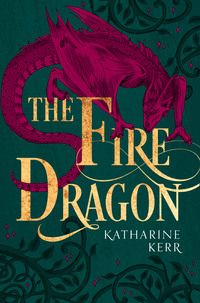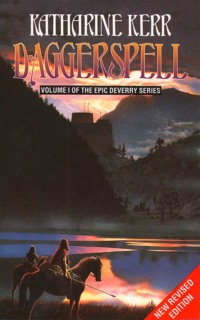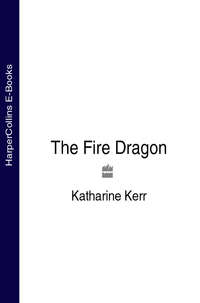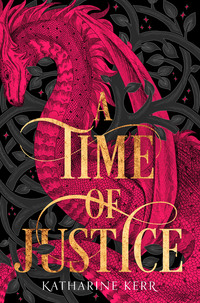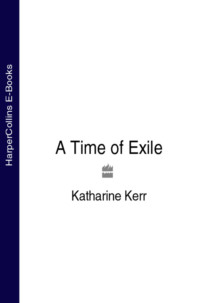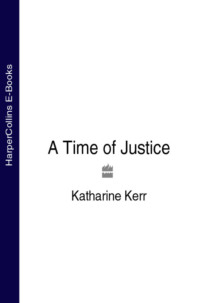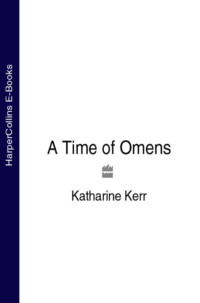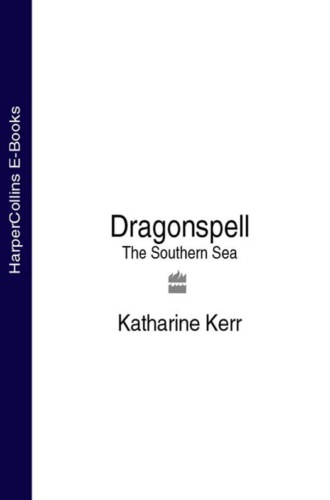
Полная версия
Dragonspell: The Southern Sea

Voyager
KATHARINE KERR
Dragonspell
The Southern Sea
The fool sees peaks rising above the water and says, ‘Look, many islands!’
The wise man knows that all are connected under the Southern Sea.
The Secret Book of Cadwallon the Druid

Copyright
Voyager
An Imprint of HarperCollinsPublishers
77–85 Fulham Palace Road,
Hammersmith, London W6 8JB
www.harpercollins.co.uk
First published in Great Britain by GraftonBooks 1990
Copyright © Katharine Kerr 1990
Katharine Kerr asserts the moral right to be identified as the author of this work
This novel is published in the United States of America under the title The Dragon Revenant
A catalogue copy of this book is available from the British Library.
This novel is entirely a work of fiction. The names, characters and incidents portrayed in it are the work of the author’s imagination. Any resemblance to actual persons, living or dead, events or localities is entirely coincidental.
All rights reserved under International and Pan–American Copyright Conventions. By payment of the required fees, you have been granted the nonexclusive, nontransferable right to access and read the text of this e-book on-screen. No part of this text may be reproduced, transmitted, downloaded, decompiled, reverse–engineered, or stored in or introduced into any information storage and retrieval system, in any form or by any means, whether electronic or mechanical, now known or hereafter invented, without the express written permission of HarperCollins e–books.
HarperCollinsPublishers has made every reasonable effort to ensure that any picture content and written content in this ebook has been included or removed in accordance with the contractual and technological constraints in operation at the time of publication.
Source ISBN: 9780586207871
Ebook Edition © AUGUST 2014 ISBN: 9780007391455
Version: 2014–08–18
Map
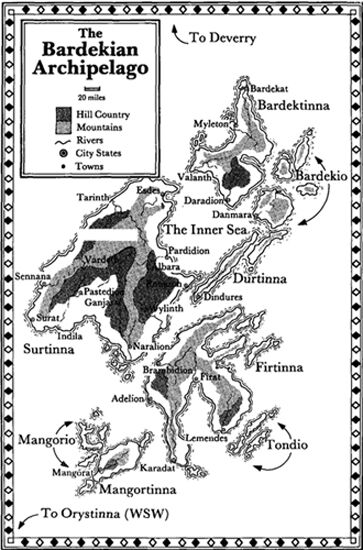
Dedication
In memory of
Howard ‘Jake’ Jacobsen
1934–1988
He is, and will be, sorely missed.
Contents
Cover
Title Page
Copyright
Map
Dedication
A Note on the Series
A Note on the Pronunciation of Deverry Words
Prologue: Eldidd, 1063
Part One: Bardek Autumn, 1063
Part Two: Deverry and Bardek Winter, 1603
Epilogue: Bardek and Deverry Summer, 1064
Keep Reading
Glossary
Acknowledgements
About the Author
Also by the Author
About the Publisher
A Note on the Series
Over the past few years, readers have asked me various questions about the Deverry series. Usually these questions are asked in noisy rooms at conventions where no one can really hear the answers, but now my publishers have kindly given me a chance to answer some of them in print, where it’s always quiet. The two things you all most want to have clarified, it seems, are the kind of magic the characters use and the way I’ve organized the books.
Deverry dweomer is very loosely based on the ‘real magic’ of the Western tradition, a field of study that can best be defined, perhaps, through its history. First, though, let me define one thing that magic isn’t, popular belief and oft-repeated clichés to the contrary. Magic is most emphatically not a substitute for technology nor is it the equivalent of technology. No more will the true magician study it only for personal gain. As a very wise man recently defined it, ‘Magic is the art of producing changes in consciousness at will and of using these changes to expand the consciousness of all humanity.’ Notice the emphasis on consciousness here. This is not to say that magic never produces any effects in the so-called ‘real’ or physical world – quite the contrary – simply that in true magic, consciousness is always central and these physical effects secondary. In Deverry, since I’m writing adventure stories first and foremost, the physical effects are quite spectacular, but this is one reason that I say the magic is very loosely based upon the Western tradition.
What is this tradition, then? Over the past two thousand years, thanks to the invective of the various churches and more recently of the scientific community, magic has had to lie hidden in the West, practised in secret, persecuted in public whenever the inquisitors got wind of it, and because of that persecution what should be an organized body of philosophical thought and spiritual practice has become maimed and garbled, conflated in the popular mind with superstition, devil worship, and the tricks and silly stories of con men and hucksters. In Asia, where no one organized religion ever got the whip hand over the soul of humanity, the situation is different. Most of you know about Yoga, for instance, a truly spiritual discipline reaching back thousands of years, or have heard about the monastic life of Buddhism and the intense spiritual insights and powers that its devotees attain after years of meditation. Western magic should have been no less.
Let me say here that when I talk about Europe and Asia, I don’t mean to deny the existence of the native spriritual systems of Africa and the Americas. I simply don’t know enough about them to discuss them intelligently. The roots of all these spiritual disciplines, however, including what should have been the European, probably lie in some common ground: the developing shamanism of Palaeolithic hunters some fifteen thousand years ago, or maybe even further back than that – I doubt very much that anyone will ever know, and you should all be extremely sceptical of anyone who says they do, particularly if these claims involve flying saucers, the lost continent of Atlantis, or other such sensational plot elements. What we do know is that by the time the art of writing was slowly spreading through the Eurasian continent, round about 2000 BC or so, shamanism had developed into a vast variety of spiritual practices, which in Asia had the good fortune to become firmly woven into the religious life of their cultures.
In Europe, Mediterranean Africa and the Middle East these spiritual disciplines flourished only until the spread of monotheism. We know their remnants as pagan mystery cults, such as those of Eleusis; we see fragments in Hellenized Egyptian religions such as the worship of Isis; we have a handful of texts of the Gnostic mystery schools, some Christianized, others not, that have miraculously survived the organized persecutions and suppressions of the Orthodox, whether Christian or Moslem, of later years. But what we have are, by and large, hardy fragments of root left from a mangled plant, cut down before its full flowering by the sort of priest who put his temporal power above the spiritual health of his flock. The one true magical system we do have is the Jewish cabbala, kept alive by a people of enormous courage in the face of slander and persecution. In those dark years, Judaism was the only major Western religion to realize that different kinds of souls have different needs, that there will always be some who want to know and to experience the truth for themselves and who are willing to leave safe territory behind to do so. Those of us who believe the same owe it and its people a huge debt.
There is no space here to give the convoluted history of the various magicians and alchemists, Christian cabbalists and Rosicrucians, to say nothing of the Sufis on the Moslem side of the equation, who struggled to keep Western magic alive during the last eighteen hundred years or so. (If you’re interested, you can find books by the historian Frances Yates in any good public library.) That they succeeded at all is amazing enough; to point out that a lot of strange weeds took root and grew in the field cleared but never sown with proper seed seems unfair, but not everyone who claimed to be a follower of the true path was one. And of course the lies and slanders continued and still continue: that magic damns you or drives you insane, that witches worship the devil, and, most recently, that magic is nothing but New Age occult-babble on the one hand or illusion and fraud on the other. As readers, you’ll all have to make up your own minds on the truth of these things. It should be clear enough by now where I stand.
As for the structure of the Deverry books, a lot of people have muttered, either to themselves or directly to me, ‘Why do you use all those damn flashbacks?’ Well, there is in this world more than one way of organizing a story – or a body of factual information, for that matter. The ‘start at the beginning and go through to the end’ principle that we’ve all been raised with dates back to classical Greek thought as transmitted by the Romans, and, as part of Aristotelian logic, it forms the basis of modern science and the scientific world-view (though one that modern physics is beginning to undermine). In this way of looking at the world, Time’s arrow flies straight and in one direction only. The magical tradition, however, teaches that you don’t necessarily have to move in a straight line to reach your destination.
Classical writers like Diodorus Siculus and Polybius state that the Celts who were their contemporaries believed in reincarnation, among other doctrines that are today part of the magical tradition. Certainly the art of the Gauls and the later flowering of Celtic art in the early Christian era are clear enough evidence that here is a people who organized information in a non-classical, non-Aristotelian manner. Since I’m writing about ancient Celts, after all, I’ve borrowed their way of looking at the world, too, in the loops and spirals of my story line as it laces between and laces up the various lifetimes of the characters. I promise, on the gods of my people if you like, that I do have a plan in mind, even if it isn’t a linear one, and I honestly do think that if you try to see it as it unfolds, you’ll get some small reward, even if it’s only a taste of what it means to think in a non-linear manner. If you’ve never seen any Celtic art, the flowing spirals and triskelia of the Gauls, the beautiful lacings and braidings of the Irish monks, by all means do yourself a favour and browse through a book about them in a library or bookshop. My own small craft is, I promise you, nothing compared to theirs.
A Note on the Pronunciation of Deverry Words
The language spoken in Deverry is a member of the P-Celtic family. Although closely related to Welsh, Cornish, and Breton, it is by no means identical to any of these actual languages and should never be taken as such.
Vowels are divided by Deverry scribes into two classes: noble and common. Nobles have two pronunciations; commons, one.
A as in father when long; a shorter version of the same sound, as in far, when short.
O as in bone when long; as in pot when short.
W as the oo in spook when long; as in roof when short.
Y as the i in machine when long; as the e in butter when short.
E as in pen.
I as in pin.
U as in pun.
Vowels are generally long in stressed syllables; short in unstressed. Y is the primary exception to this rule. When it appears as the last letter of a word, it is always long whether that syllable is stressed or not.
Diphthongs generally have one consistent pronunciation:
AE as the a in mane.
AI as in aisle.
AU as the ow in how.
EO as a combination of eh and oh.
EW as in Welsh, a combination of eh and oo.
IE as in pier.
OE as the oy in boy.
UI as the North Welsh wy, a combination of oo and ee. Note that OI is never a diphthong, but is two distinct sounds, as in carnoic (KAR-noh-ik).
Consonants are mostly the same as in English, with these exceptions:
C is always hard as in cat.
G is always hard as in get.
DD is the voiced th as in thin or breathe, but the voicing is more pronounced than in English. It is opposed to TH, the unvoiced sound as in th or breath. (This is the sound that the Greeks called the Celtic tau.)
R is heavily rolled.
RH is a voiceless R, approximately pronounced as if it were spelled hr in Deverry proper. In Eldidd, the sound is fast becoming indistinguishable from R.
DW, GW, and TW are single sounds, as in Gwendolen or twit.
Y is never a consonant.
I before a vowel at the beginning of a word is consonantal, as it is in the plural ending -ion, pronounced yawn.
Doubled consonants are both sounded clearly, unlike in English. Note, however, that DD is a single letter, not a doubled consonant.
Accent is generally on the penultimate syllable, but compound words and place names are often an exception to this rule.
I have used this system of transcription for the Bardekian and Elvish alphabets as well as the Deverrian, which is, of course, based on the Greek rather than the Roman model. On the whole, it works quite well for the Bardekian, at least. As for Elvish, in a work of this sort it would be ridiculous to resort to the elaborate apparatus by which scholars attempt to transcribe that most subtle and nuanced of tongues. Since the human ear cannot even distinguish between such sound-pairings as B> and
PROLOGUE
Eldidd, 1063
Alaf yn ail; mail am lad;
Llithredawr llyry; llon cawad,
A dwfn rhyd; berwyd bryd brad.
Cows in the byre, beer in the bowl.
Rain floods the fierce-flowing ford
And slick paths. A soul stews over treason.
Llywarch the Ancestor
Even though dark clouds hung close to earth all day in what might have been either a heavy fog or an outright drizzle, out in the sacred grove beyond the city walls of Aberwyn the ancient oaks glowed with a light of their own, the autumnal splendour of their scarlet and gold leaves. A few sparks of that flame had fluttered down to lie in the muddy grave like golden offerings to match the grave goods already in place, jars and ewers of mead and oil, loaves of bread, a fine sword in a gilded scabbard, pottery statues of the gwerbret’s favourite horses, all set around the wicker-work chariot. Although Deverry men had stopped fighting from chariots some thousand years earlier, their memory persisted as a thing belonging to heroes, and great men were buried in them, but lying down, unlike their ancestors, who were sometimes propped up in a parody of action that seemed indecent to Deverrian minds.
Lovyan, Tieryn Dun Gwerbyn, regent to the gwerbretrhyn of Aberwyn, stood at the edge of the grave and watched the shaven-headed priests of Bel clambering around in the mud as they laid the body of Rhys Maelwaedd, her eldest son, down for his last rest. By then the rituals were long over, and most of the huge crowd of mourners gone, but she lingered, unable to cry or keen, weary to the very heart, as they arranged his fine plaid, the silver, blue, and green of Aberwyn, around him. Once they began to fill in the grave, she would leave, she decided. She had watched wet earth fall on the faces of other men she had loved, her husband, her second son Aedry, the third son dead in childbirth that they’d never even named; she had no need to watch it again.
Beside her Nevyn laid a comforting hand on her shoulder. A tall man, with a shock of white hair and piercing blue eyes, he had skin as wrinkled as one of the fallen leaves and hands spotted all over from age, but he stood as straight and walked as vigorously as a young warrior. Although everyone who knew him considered his energy a marvel, Lovyan was one of the few who knew the truth, that he owed it to the dweomer of light, because he was one of the greatest sorcerers who had ever lived in Deverry. Just lately he had come into her service as a councillor, but in truth, she assumed, she was the one who was serving his particular ends. It mattered not to her, because not only did she trust him, but their particular goals were, for the moment at least, the same.
‘It’s cold out here, Your Grace,’ he said, his voice soft with sympathy.
‘I’m well aware of that, my thanks. We’ll be leaving soon.’
The priests were fastening the enormous golden ring-brooch to the plaid and clasping it closed around the dead gwerbret’s neck. She looked away and saw two men pushing a slab of stone, balanced on a hand-cart, towards the grave. The epitaph was already carved, an englyn of praise for the ruler of Aberwyn, lost to a hunting accident, but of course, it never mentioned the true cause of his death: evil dweomer. She shuddered, remembering the day when they’d ridden out together to fly their hawks. They’d been calmly trotting down the river road when Rhys’s horse had gone mad, bucking and rearing, finally falling to crush its rider. Even at the time the accident had seemed inexplicable; later she had learned that dark dweomermen had caused the horse’s madness and thus had murdered Rhys as surely as if they’d used a sword. Why? That, no one knew.
The priests climbed out of the grave and signalled to the diggers, leaning on their shovels nearby. Lovyan blew a kiss at her dead son.
‘Sleep well, little one,’ she whispered, then turned away. ‘Come along, all of you. We’d best get back to the dun.’
Nevyn took her arm, and the small crowd of pages and serving women fell in behind her as they made their silent way to the edge of the grove, where her escort was waiting. Twenty-five men of Rhys’s warband and fifteen of her own stood at respectful attention beside their horses. As she approached, her captain, Cullyn of Cerrmor, led over her horse, a beautiful golden mare with a silvery mane and tail, and held it for her as she mounted and adjusted her long dresses and cloak over the side-saddle.
‘My thanks, captain.’ She took the reins from him, then turned in the saddle to make sure that the rest of her retinue were ready to ride. ‘Well and good, then. Let’s get back home.’
At the captain’s signal the men mounted, and the procession set off, Lovyan and Nevyn at the head, her women and pages just behind, and bringing up the rear, the warbands. As they rode up to the high city walls, the men on duty at the gates snapped to smart attention, but Lovyan barely saw them, so wrapped in numb grief was she. It’s all been too much, she thought to herself; simply too much to bear. Yet in her heart she knew that she could indeed bear it, that she would somehow find from somewhere the strength to see her through the difficult months ahead. Many noblewomen, it seemed, lived lives that allowed them the luxury of hysterics; they could wallow in fits of weeping, or shut themselves up dramatically in their chambers and get sympathy from half the kingdom with no one being the worse for it; she, however, had always had to stifle her griefs and rise above her weaknesses. At times, such as that moment in the chilly drizzle, she resented it, but even in her resentment she knew that she’d been given the better bargain by the gods.
As the procession wound through the rain-slick cobbled streets of Aberwyn, the townsfolk came out of house and shop to pay their respects quite spontaneously to the tieryn, who had been well-liked here when she’d been the wife of the then gwerbret, Tingyr, before their son Rhys inherited the rhan. Their heads bared to the drizzle, the men bowed and the women curtsied, and here and there someone called out ‘Our hearts ache for you, Your Grace’, or ‘Our sorrows go with you’. Lovyan’s heart ached more for them. Soon, unless she and Nevyn were successful in averting it, war would ravage Aberwyn’s prosperous streets, and these people would have more to sorrow over than her mourning.
The rank of gwerbret was an odd one in the Deverry scheme of things. Although by Lovyan’s time the office passed down from father to son, originally, back in the Dawntime, gwerbrets had been elected magistrates, called ‘vergobretes’ in the old tongue. A remnant of this custom still survived in the Council of Electors, who met to choose a new gwerbret whenever one died without an heir. Since the rank brought with it many an honour as well as a fortune in taxes and property, every great clan and a few optimistic lesser ones as well vied among themselves to be chosen whenever the line of sucession broke, and more often than not, the contest turned from a thing of bribes and politicking into open war. Once the Council got to fighting among themselves, the bloodshed could go on for years, because not even the King could intervene to stop it. Any king who marched in defiance of the laws would find himself with long years of resentment and rebellion on his hands. The most his highness could do was use his honorary seat on the Council to urge peace if he were so minded, or to politick along with everyone else for the candidate he favoured. The latter was the more usual occurrence.
Since Rhys had died childless, the members of the Council were already jockeying for position at the starting line of this possible horse race. Lovyan knew full well that they were beginning to form half-secret alliances and to accept gifts and flatteries that were very nearly bribes. She was furious, in a weary sort of way, for though Rhys had no sons, he did leave a legal heir, one marked with the approval of the King himself, Rhodry, Rhys’s younger brother and her last-born son. If only Rhodry were home safe in Aberwyn there would be no need for Council meetings disguised as social visits, but he had been sent into exile some years before by a fit of his brother’s jealousy and no better cause. Now, with the King’s own decree of recall published and all Aberwyn waiting for him as heir, he had disappeared, as well and thoroughly gone as a morning mist by a hot noontide. When the King had made his proclamation of recall, some days before, his highness had set the term as a year and a day – just a year and a day for them to find the heir and bring him home. Less than that now, she thought; an eightnight’s almost gone.
Although she was certain that Nevyn knew his where abouts, the old man was refusing to tell her. Every time she asked, he put her off, saying that someone was on their way to bring Rhodry back home and no more. She knew perfectly well that her son was in some grave danger. By trying to spare her feelings, Nevyn was making her anxiety worse, or so she assumed, thinking that her troubled mind would no doubt make up worse dangers than her lad was actually in. She suspected that some of those who coveted Aberwyn had kidnapped him, and she lived in terror that they would kill him before Nevyn’s mysterious aide could rescue him. If, however, she had known the truth, she would have seen the wisdom in Nevyn’s silence.


